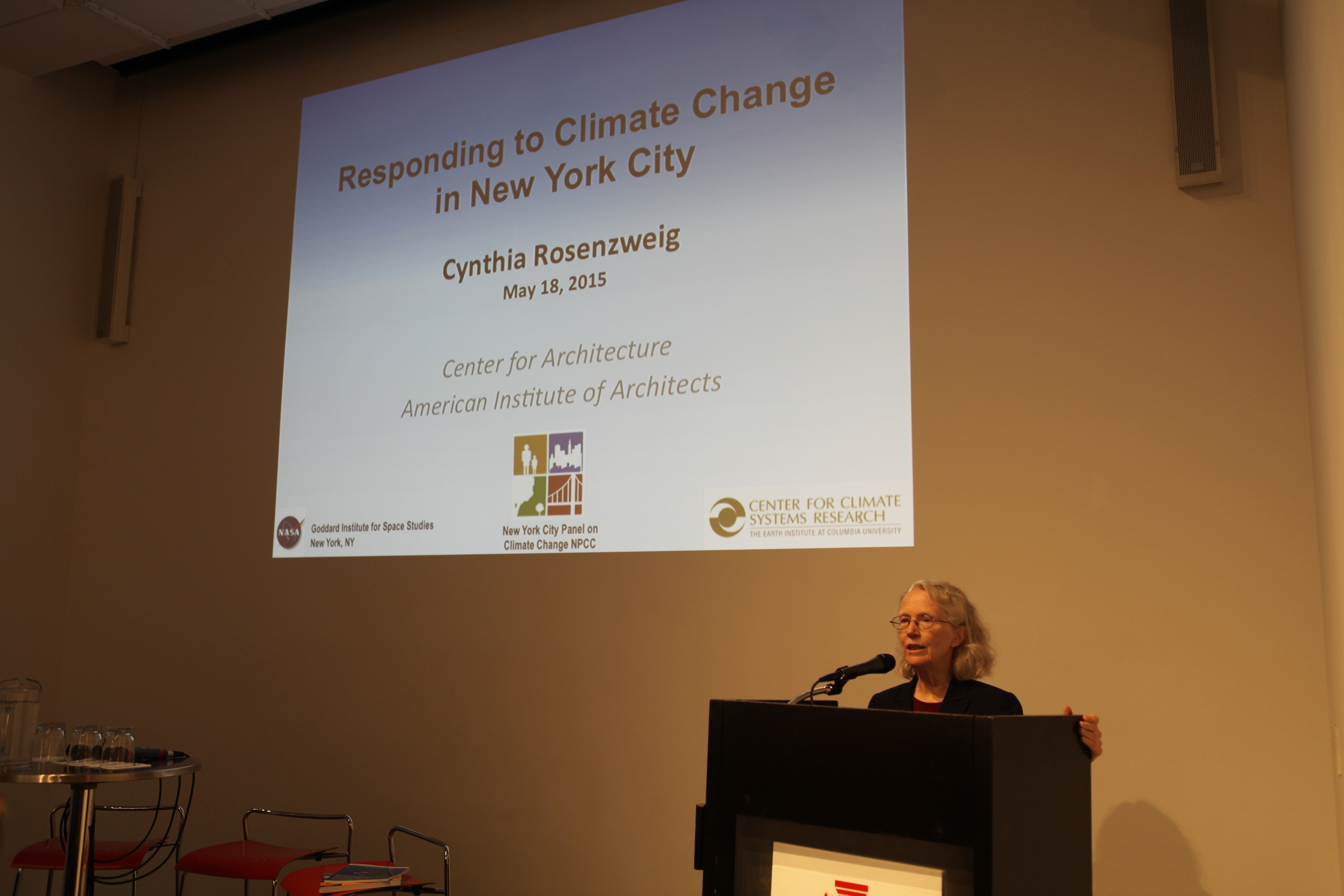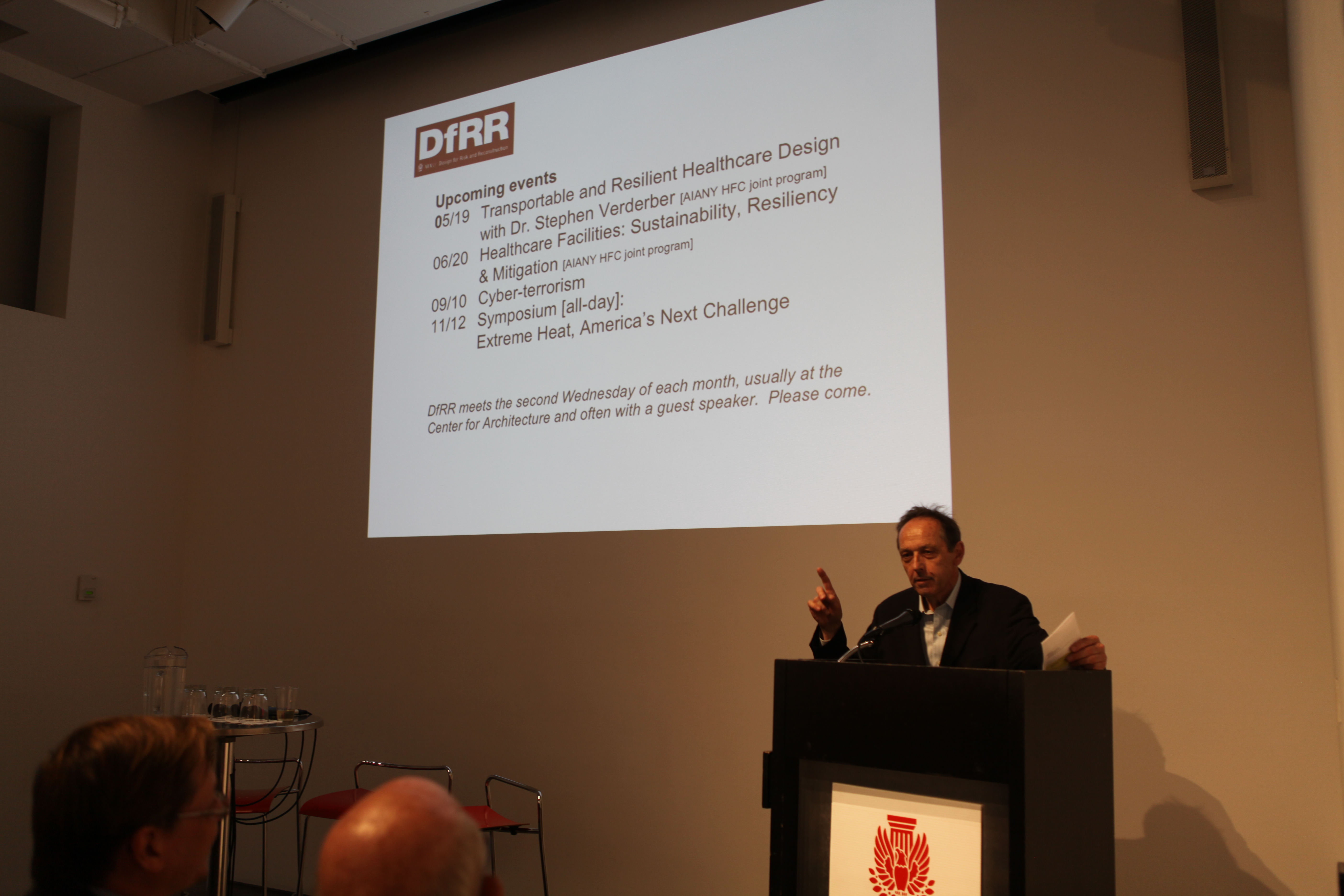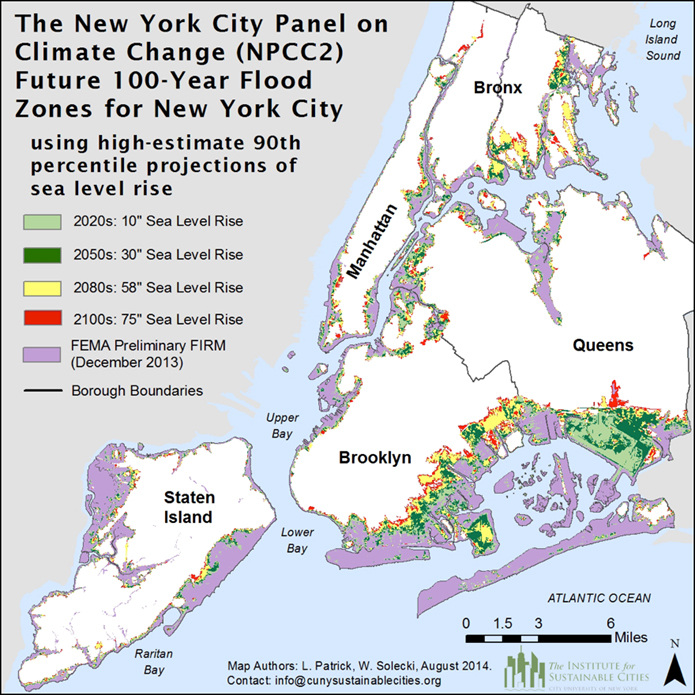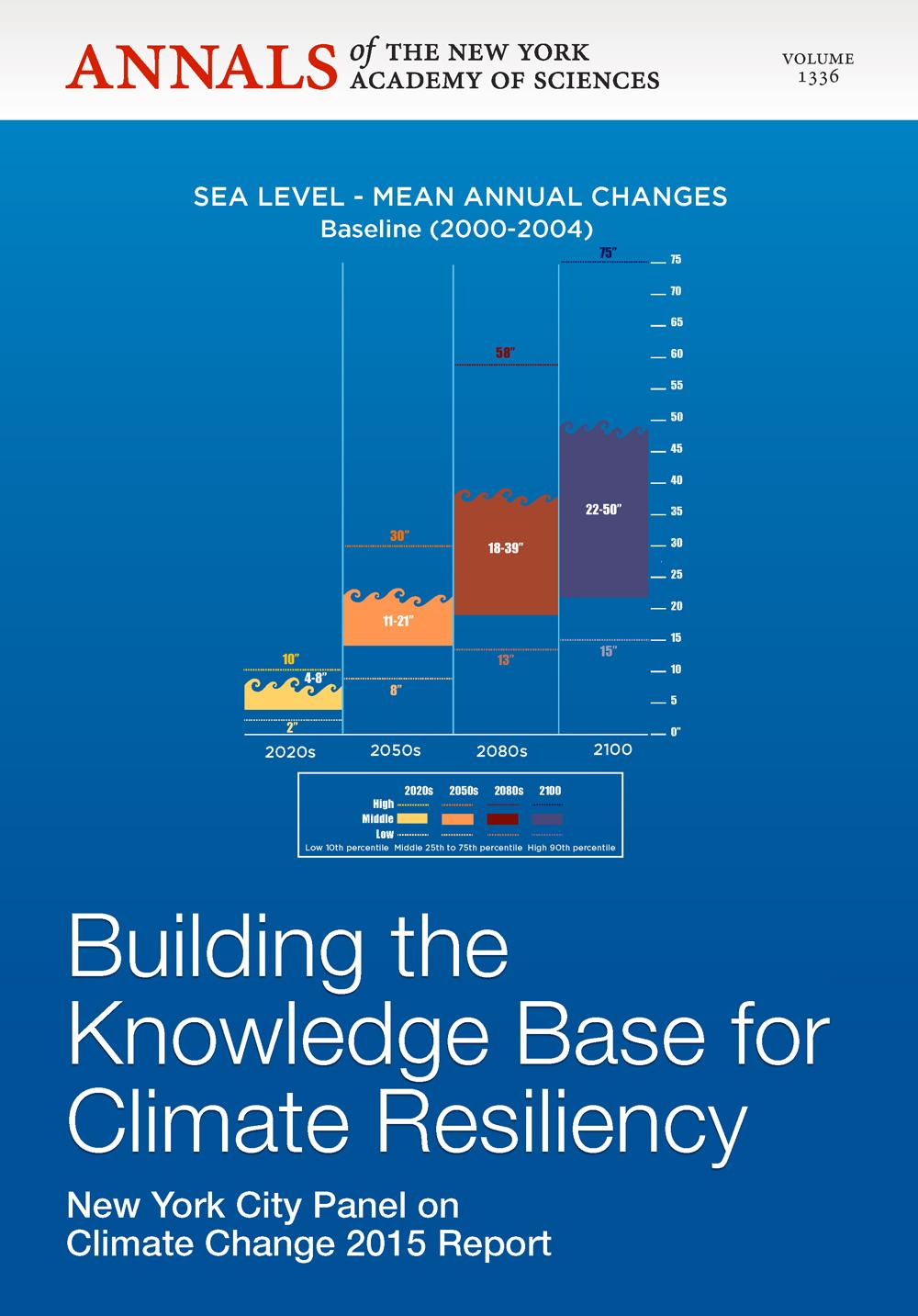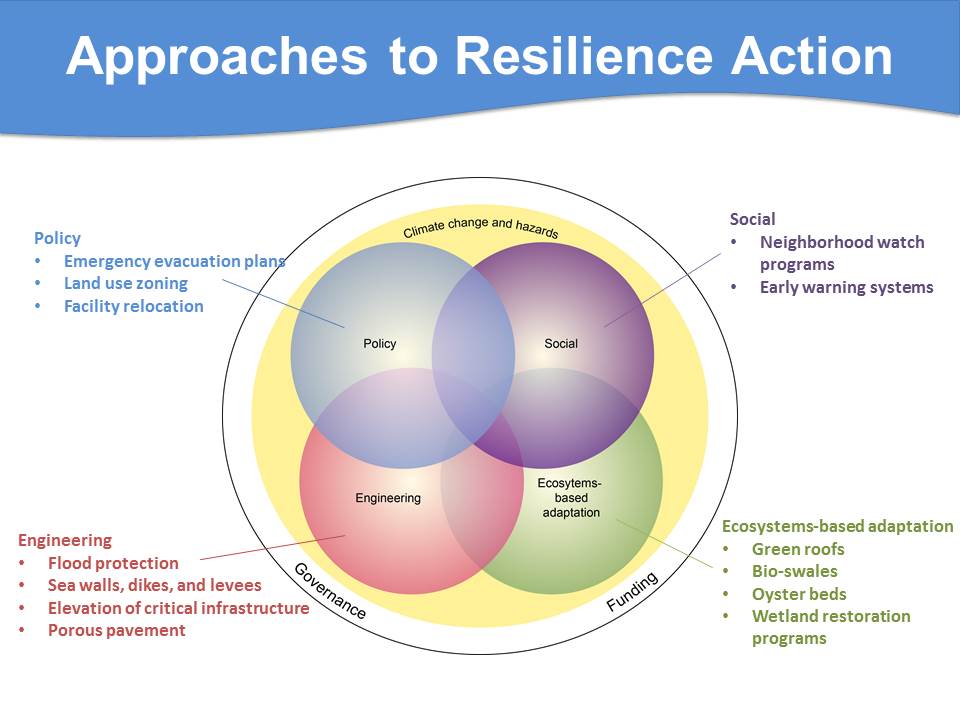by: ggarrett
A group of resilient design advocates gathered on 05.18.15 for a rare opportunity to dive into the research of Dr. Cynthia E. Rosenzweig, a leader in the field of climate change for more than 20 years. Rosenzweig is a senior research scientist at the NASA Goddard Institute for Space Studies, where she heads the Climate Impacts Group. She also serves as co-chair of the New York City Panel on Climate Change (NPCC), an independent body that advises the city on climate risks and resiliency. In his introduction to this special guest, AIANY Interim Executive Director David Burney, FAIA, noted that Rosenzweig truly is “a champion, a wise scholar, and a brilliant woman.”
Despite Rosenzweig’s extensive knowledge about the risks of climate change, she is optimistic about our future. Throughout the program, hosted by the AIANY Design for Risk and Reconstruction Committee (DfRR) on the occasion of the committee’s fourth anniversary, Rosenzweig asserted that climate change is “the most serious issue of our time, planetarily and environmentally,” but also highlighted that this global relevance has united us, creating evermore effective pathways to sustainability.
Understanding our changing climate system and the broader risks that arise from evolving ecologies is of growing importance to every profession and every geographic region of the world. We have seen places disappear in the face of natural disasters, causing the loss of much more than architecture; cultural histories, economic assets, ecosystems, and human lives have all been impacted.
An estimated 75% of Bangladesh is less than 10 meters above sea level, resulting in frequent floods, but also generating local grassroots flood-proofing efforts. In Japan, nearly $300 billion in government funds have been appropriated for ongoing reconstruction efforts after the Tohoku earthquake and tsunami in March 2011, a notable contrast to the $68 billion earmarked for post-Sandy reconstruction in the northeastern United States. As a result, this initial government relief funding is “almost acting like seed capital,” explained Illya Azaroff, AIA, founding co-chair of DfRR. There is an expectation that other public and private sources will provide the remainder.
The experiences of each of these nations hold lessons that apply to our own metropolitan region, just as we have our own local insights to share. Rosenzweig has seen time and time again that, when effectively shared, good data and powerful projections act as the critical precursors to meaningful change in our policies, funding models, and local behaviors. After Mayor Bloomberg first convened the NPCC in 2008, the organization was codified in August 2012 with Local Law 42, which requires regular climate science updates. Even before Hurricane Sandy, New Yorkers recognized that the city’s knowledge base needed to grow and continually evolve because climate systems themselves are constantly changing.
The discussion with Rosenzweig revealed several opportunities to improve the ways in which we act on our knowledge base. For example, New York City could benefit from a reframing of the return on investment of resiliency upgrades, particularly among landowners and developers. In both Germany and the Netherlands, there is evidence that resiliency investments pay back significantly, both in the value of the land that is preserved and through the amenities that the land can support.
Similarly, New York may want to reconsider how political achievements are recognized. Elected officials serve relatively short terms when compared with the duration of transformational infrastructure projects. For example, if the incremental successes of an administration were acknowledged by celebrating each square mile of wetland preserved or each subway station completed, “our elected officials might be more prone to support projects that would not be completed during their term,” offered Lance Jay Brown, FAIA, founding co-chair of DfRR.
From Rosenzweig’s perspective, the complexity of the risks involved with climate change require that we take a “portfolio approach” that incorporates a diversity of strategies. Professionals in the built environment, particularly those who commit to maintaining a financial understanding of resiliency investments, are able to coordinate this type of portfolio at both the micro and macro scales. Professionals such as architects, designers, and planners are already engaged with the social, political, engineering, and ecological strategies needed for this type of approach.
Rosenzweig also acknowledged the progress that is already being made toward environmental action in New York City. Mayor de Blasio’s 80×50 commitment to reduce greenhouse gas (GHG) emissions by 80% over 2005 levels by 2050 directly addresses energy efficiency, a key aspect of GHG mitigation. The NPCC will convene for a third time this summer to further advise the city on a variety of climate change topics. Later this year, the 21st Session of the Conference of the Parties to the United Nations Framework Convention on Climate Change (COP21) will take place in Paris, which may result in a shared approach to climate change across the world’s nations.
Despite the great strides already taken toward resiliency, a number of puzzles remain to be solved, from top-down policy changes, to empowered action from the bottom-up. In short, we must be resilient in our ongoing resiliency efforts, both here in New York City and as part of our global community.
Gisela Garrett is the Communications Director of BKSK Architects, and frequently writes about the evolving practice of public interest design. Follow her on Twitter at @giselataylor.
Event: Climate Change an Key Policy Decisions: A Conversation with Dr. Cynthia Rosenzweig
Location: Center for Architecture, 05.18.15
Speakers: Dr. Cynthia Rosenzweig, Adjunct Senior Research Scientist, Center for Climate Systems Research/Goddard Institute for Space Studies; Richard Gonzalez, AIA, Design for Risk and Reconstruction Committee; Illya Azaroff, AIA, Founding Co-chair, DfRR; and Lance Jay Brown, FAIA, Founding Co-chair, DfRR
Organizer: AIANY Design for Risk and Reconstruction Committee








